- Home
- John Harris
Swordpoint (2011) Page 2
Swordpoint (2011) Read online
Page 2
The Divisional General was waiting near the trucks with Yuell, the colonel of the North Yorkshires, to watch them march in. Because the mud was grey, the trucks were grey and the men were grey. Everything was grey. War, the general supposed, was a grey business.
Every vehicle in the world appeared to be rumbling up and down the road and every soldier in the world seemed to be waiting by its side. The line of vehicles was endless. Trucks packed with fuel, food and ammunition. Trucks packed with men in a dun mass, crammed close together with their equipment and weapons. There were clean soldiers moving north; and dirty soldiers, caked with mud, moving south. It went on continuously; the only difference between the British and the Americans was that the Americans drove faster.
It was a hybrid army. There were British from England, Scotland, Ireland and Wales, Americans from New York and the Deep South, New Zealanders, French, Poles, Sikhs, Gurkhas, all crammed together in a scene of vast confusion, their only common denominator their aim to destroy Nazi Germany in Italy. Small coloured signs dotted either side of the highway, telling you in pictures and numbers exactly where everybody was.
As the general waited, the weary soldiers passed him almost without seeing him, moving in a steady subconscious rhythm. As they reached the boarding point, an officer helped them drag their weary bodies into the backs of the trucks where they immediately lolled sideways into sleep. As the vehicles filled up and rumbled off, they jolted past the wayside graves and the tangles of telephone cables and the signs that warned of dangerous curves and the corners that came under shellfire.
They felt they had come through a furnace which had scarred them all, purging them of emotions, leaving nothing but the desire to rest.
Two
The Germans watched them go. The artillery dropped a few shells on them as they went, but the gunners must have been in a good mood because they didn’t appear to do any damage. Yet from San Eusebio, where Captain Werner Reis stood, you could see across the whole valley in front. From the monastery, Captain Reis sometimes felt, you could probably see all the way to Africa.
He studied the land about him, a lean hard soldier who, under the leathery skin and the strapped and belted authority, was surprisingly young. His face was thin, all high cheekbones and hard angles, as though the years of war had honed him down until there wasn’t an ounce of flesh on him; and his body, already scarred with three wounds, was sinewy and strong. Despite the conditions, despite the rain, despite the cold, he was grateful to be in Italy, because he’d picked up his third wound near Stalingrad eighteen months before and had been evacuated by air just before it was too late.
Reis was a Rhineland Catholic from Andernach and he went to the church in San Eusebio every week. Despite the fact that most of the population had left, the priest, a doddering old man who couldn’t bear to put his life’s work behind him, still held Mass, and Reis never failed to attend. It didn’t seem strange to him that he should believe so ardently yet still be serving the godless gang who ruled in Berlin. He was a good German and, though he didn’t believe the propaganda that blamed the war on the enemy, he certainly believed in Germany and knew that after the First World War the Allied politicians had never given her a chance to get on her feet again. He was not unusual in his loyalties. The general who was running the show was not only a Catholic, he was also a former Rhodes Scholar and graduate of Oxford, an anglophile, an officer with known anti-Nazi feelings and, above all, a lay member of the Benedictine Order.
Reis lit a cigarette and looked over his personal stretch of front again. On his right was Highway Six, the road to Rome, running up the Liri Valley, and on his left, round the corner of the mountain, the ruined town of Cassino. Above and behind him was what was left of the monastery, and it gave him a comfortable feeling of security to know it was there. Just in front of it was the hill the British called Hangman’s Hill. Behind that lay the ridge they called Snakeshead, and Monte Cairo. Behind the town was Castle Hill which he knew as well as everybody else was – after San Eusebio – the key to the monastery. With San Eusebio in their hands, the Allies could see what was taking place on Castle Hill, and Castle Hill dominated the other outlying spurs. One by one, they led to the top, to the monastery itself.
To the south of Cassino the land was flat until you reached the Arunci Mountains, the road heading across the plain for the town as straight as an arrow from south-east to north-west until it reached the iron bridge across the Rapido. On its south-western side was the railway, and both town and station were still securely held. Overlooked from the mountains behind, it had long been obvious to the Allies that an attempt to get at them would be spotted at once from the heights. The only way they could capture them was by crossing the river on the flank and moving along the bank on the German side, so that the strongpoints would wither on the stem. So far, after months of hammering, all they’d managed was a meagre foothold in the hills to the north.
In all his days of soldiering, and they were many now, Reis had never seen a stronger position. The whole art of defence was to choose a place where you could see the enemy without being seen yourself; and here, in front of Monte Cassino, everything fitted those requirements perfectly. San Eusebio looked like a watch-dog waiting in the entrance to its kennel. Behind the village and curling round its sides was a high escarpment of rocks, covered here and there with thin bushes and small trees. This was the position’s only disadvantage because, unlike all the other German positions, it could not be covered by crossfire from the sides. With the village in British or American hands, the escarpment would protect the north end, where some of the buildings were actually built on to the cliff and where caves for wine cellars had been cut out of the rock. Leading from the river was a switchback road winding round its eastern slopes through a series of hairpin bends. In summer, trees softened the outlines but now, with the slopes bare and the gales sweeping the dark clouds across from the Abruzzi, the place seemed a stark symbol of defiance.
The last of the British lorries disappeared and a final flurry of shells dropped across the river among the smoke which had been put down to hide their departure. Because they were seen everywhere they moved, the Allies could not hold the river bank. The Germans could see everything, even a single lorry or a single man. They could slip patrols across the river after dark to lay minefields on the approaches to the river, and, if the Allies managed later during the night to clear them, could lay them again the next night. Indeed, German patrols could roam almost at will on the opposite bank, while no Allied patrol ever managed to survive long on this side.
‘Wonder who’s taken their place,’ Reis said.
‘Indians or Poles?’ Lieutenant Maximilian Thiergartner peered through his binoculars alongside him, watching the land opposite. ‘I hope it’s not the Poles. The Poles have a special reason for being unpleasant.’
‘You scared, Thiergartner?’ Reis asked.
‘Yes, Herr Hauptmann, I am.’
Reis glanced quickly at the younger officer. He was only twenty, blond, blue-eyed, innocent-looking, and Captain Reis often thought that after his years in the Hitler Youth he ought to have been a lot more dedicated. He had a violin which he played well and sometimes used to entertain them in the evenings. Once, further south, some humorist, opposite had heard it and yelled, ‘How about Mother Machree, mate?’ It had seemed to please Thiergartner.
‘You damned well shouldn’t be scared,’ Reis growled.
Thiergartner remained unruffled. ‘Aren’t you scared, Herr Hauptmann?’ he asked. ‘When you think of what’s in store for Germany? They’ll accept nothing but unconditional surrender and they’ll not even talk to anyone who’s been a National Socialist.’
There was a lot of truth in what the boy said and Reis was thankful he’d resisted the temptation to join the Party in 1940 when it might have helped a career which seemed to have been marching a long time without getting anywhere.
‘Shut up,’ he said uncomfortably. ‘We don’t talk like that.’
/>
The boy was probably a bit of a weak number, he felt. Though not a harsh man, Reis took his job seriously and didn’t enjoy having someone in his unit who was likely to give at the first real shove. Which was why he’d posted Thiergartner on this knoll just to the east of San Eusebio. The position faced a stretch of rough ground where even a couple of good sergeants could hold back an enemy.
‘Your people all right?’ he asked.
‘Most of them,’ Thiergartner said.
‘What’s that supposed to mean?’
‘Like the poor, Private Pulovski’s always with us?’
Pulovski was a gentle soul, a country man from Thuringia, whose hands were all thumbs.
Thiergartner smiled. ‘However, we also have some sound men, all under the good Obergefreiter Seidle.’
Reis grunted. ‘Does Pulovski bother you?’
Thiergartner smiled. ‘Not at all, Herr Hauptmann. I just feel sorry for him.’
‘You’re not here to feel sorry,’ Reis growled. ‘Can you handle him?’
‘Oh, of course, Herr Hauptmann.’ Thiergartner’s smile widened. ‘I make him laugh and then he eats out of my hand.’
‘Who’s down by the river?’
‘Gefreiter Pramstrangl.’
Captain Reis grunted again. He didn’t think much of Gefreiter Pramstrangl either. He was slow and cautious and an Austrian into the bargain, and Reis didn’t trust him.
He put down his binoculars and glanced about him. The countryside was silent, and across the river the land seemed deserted again. It was the weirdest sensation, as though they were in an empty landscape. Yet he knew there were thousands of enemy troops just across the strip of grey metallic water, staring towards him, probably all thinking exactly as he was thinking.
‘Well,’ he said, ‘they’ve gone. All we have to do now is sit back and let the war look after itself for a bit.’
As it happened, however, there was more to it than that. Because somebody had produced a plan.
And, as one of the New Zealanders had once said, there was nothing like having a plan – even if it was a poor one.
Three
‘Object,’ the plan said: ‘The crossing of the Liri and the occupying of the north bank near San Eusebio; to consolidate and expand the bridgehead, with the ultimate objective of by-passing the enemy position at Cassino.
‘Reasons: The key to this sector is San Eusebio. With San Eusebio in our hands, all the land to right and left would be under observation. Within the past few days there have been increasing indications that, due to recent Allied pressure, enemy strength in this area is ebbing through casualties, exhaustion and low morale. From this it can be assumed that he has no fresh reserves, only a few tired ones, and it is considered that an attack on San Eusebio will cause him to withdraw.
‘Suggestions: An assault crossing, the first flight to be silent and at night – launched from points on the near bank opposite San Eusebio to a mile upstream – to cross the highway and seize the far bank and escarpment east and north of the village. All to be undertaken with covering artillery fire, and preceded by an air strike by the RAF. A rapid follow-up in daylight, with tanks, under all available covering fire, to build up the bridgehead, then a rapid advance from the bridgehead to capture San Eusebio.
‘Details: Initial attack, at brigade strength, should go in opposite San Bartolomeo Bucelli and Foiano di Miscano, and as soon as the bridgehead is established, a second brigade should pass through towards San Eusebio on D + 1. Rapid consolidation is vital as enemy is bound to throw in counter-attacks from the direction of San Eusebio or further east. Steady pressure could be kept up elsewhere as a diversion.’
And so on and so on.
Two days before the idea hadn’t existed.
It hadn’t merely sprung into existence, however. It was something that had been growing for quite a while.
The political benefits of capturing Rome exercised a not inconsiderable influence on the people in London, just as its retention exercised an equal influence in Berlin. At first it had seemed that Fascism had been utterly discredited by the fall of Mussolini the previous year, but his rescue from captivity, coupled with the adherence to him of a few disreputable but well-known figures, had brought the Italians, who had thought they had seen the last of the war, back into the fight under the Duce’s tattered banners. So the Italian campaign, which had been intended by the Allies to tie down German divisions, was now doing the opposite and tying down Allied divisions. At Alamein they had quoted Henry V on the emotions of St Crispin’s Day, but that attitude had worn a little thin on the long struggle up the narrow peninsula from Sicily, and Cassino had finally stopped them dead.
It had been said as long ago as the Boer War – and doubtless even before that – that heights were the key to any military situation, and at Cassino most of them were in the hands of the Germans. Something had to be done to break the deadlock, and it was therefore inevitable that the plan would attract attention. It caught the eye of the army commander at once.
‘Where’s this come from?’ he asked.
His chief of staff glanced at the folder over his shoulder. ‘19th (Indian) Division, sir. I gather it’s actually the idea of the divisional commander, Royal Artillery – Brigadier Heathfield.’
The army commander was unimpressed. ‘Seems to be assuming a lot about German weakness,’ he observed. ‘Outflanking Cassino with a crossing’s already been tried by the Americans – with disastrous results – and, with the approaches as waterlogged as they are, I shouldn’t imagine anybody’s in favour of trying another until they’ve dried out.’ He paused. ‘But, you know, I think we might use the idea. If nothing else, it’ll keep the Germans too busy to know what else we’ve got up our sleeve. Who’ve they got?’
‘Tallemach’s Seventh Brigade, sir. That’s the North Yorkshires, the Yellowjackets and the Baluchis. And Rankin’s 9th (Indian) Brigade, which is the Birminghams, the Rajputs and the Punjabis. 11th Indian’s also in the mountains there. They’re supposed to be earmarked already, but I suppose they could be used if they’re needed.’
The army commander frowned. ‘We can pull the Yorkshires and the Yellowjackets out and refit them,’ he said. ‘Then send them in again south of the town. Get hold of Corps.’
‘You will make a strong thrust across the river towards San Eusebio. More than one crossing should be planned, and when the breach is created every effort will be made to link up rapidly.’
Not ‘You will try to’, Major General James Tonge noticed – as he always noticed, whether he were receiving the orders or writing them himself – but ‘You will’. It was never a good idea to send a man into action with the suggestion of an option.
Tonge was a small man, round-faced and ruddy, with a clipped military moustache and a heavy limp, a relic of North Africa. Known to his troops as the Limping Limpet, he was a friendly man and, like most British divisional commanders in 1944, highly experienced. His faults were human rather than professional in that he was kind-hearted and too much inclined to let his subordinates have their heads. And, unfortunately, his 19th Indian Division was no longer as good as it had been.
The tendency since the desert to imagine that all future battles would be tank versus tank had been completely destroyed in Italy. Infantrymen were more important than ever and, with the rifle and the hand grenade once more the final arbiters of the battlefield, what was needed now was not vehicles, artillery or aircraft but men. A fresh brigade to throw in after a week’s fighting would have made a great deal of difference; but Tonge’s division had become depleted and weary, and the few replacements who had arrived had brought with them the established habits and practices of the army in England.
Italy was different. It was different from the desert and very different from England. They even had a different name for the Germans – not Jerries but Teds, from Tedeschi, the Italian word for them.
General Tonge was very much aware of his problems. He was a capable man, but suspected
that since being wounded in Libya he had slowed down. And when he’d returned to duty it was to find himself saddled with a staff of whom he knew little and who, in many cases, were new to their jobs. Because he wasn’t there to hang on to them, the experienced men he’d directed before his wound had all been whipped away to England to handle the problems of the Second Front, and he felt the new lot weren’t as good and were never likely to be. This troubled him because when soldiers felt the staff were capable of making sure that everything worked, morale was high. Unhappily, General Tonge no longer felt he could guarantee this.
Despite his doubts, his headquarters reflected an atmosphere of brisk efficiency, rather like an important office in the City of London full of young executives keen on their jobs and well on top of it. It was situated off the main road in a villa set in its own grounds and marked with the tall dark flames of cypresses. Near the gateposts, military policemen stood on guard, and over the house the yellow divisional banner with its black dragon fluttered limply in the thin breeze. The house belonged to a wealthy Roman who was now on the other side of the front line, and that part of the building occupied by Tonge’s headquarters looked a little like an English country club, with The Tatler, The Field and Country Life prominently displayed among the out-of-date copies of The Times and The Daily Telegraph.
Most of what had been done to make it comfortable was the work of Brigadier Wallace Heathfield. Heathfield was a thruster by nature, looked like a thruster and believed in being a thruster. He was a tall man inclined to plumpness, and his round face and smooth blond hair were instantly belied by his brisk manner. He had the energy of two men and, because he liked his comfort, enjoyed keeping an eye on the mess in addition to his own jobs as commander of the divisional artillery and the divisional commander’s confidant and virtual deputy. A compulsive interferer, he felt he had found his niche on Tonge’s staff, and his swift, ingratiating manner, heartily disliked by the men he dealt with, had seen him rapidly promoted. Heathfield got things done, whether it was the acquisition of clothing, ammunition or vehicles; the improvement of medical facilities; or merely the sorting out of the quarrels between the cook and the mess sergeant. He was also well-known in the army as a bridge player, though Tonge had noticed that he liked to win and that if he didn’t he was inclined to sulk.

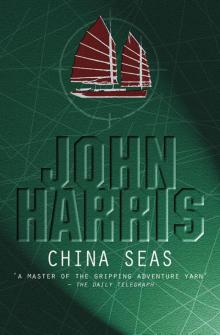 China Seas
China Seas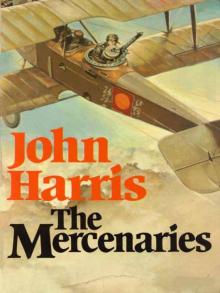 The Mercenaries
The Mercenaries Road To The Coast
Road To The Coast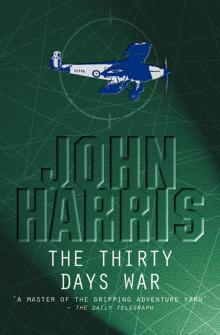 The Thirty Days War
The Thirty Days War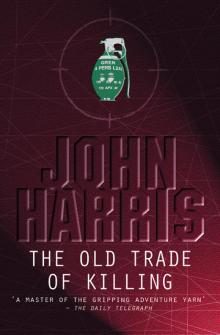 The Old Trade of Killing
The Old Trade of Killing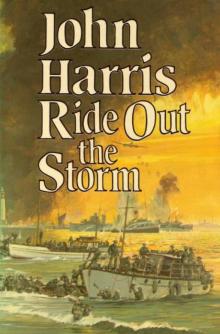 Ride Out The Storm
Ride Out The Storm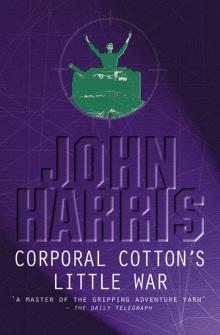 Corporal Cotton's Little War
Corporal Cotton's Little War Fox from His Lair
Fox from His Lair Paint The Rainbow
Paint The Rainbow Flawed Banner
Flawed Banner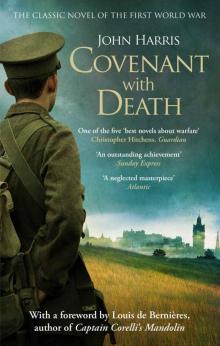 Covenant with Death
Covenant with Death So Far From God
So Far From God The Sea Shall Not Have Them
The Sea Shall Not Have Them The Cross of Lazzaro
The Cross of Lazzaro Smiling Willie and the Tiger
Smiling Willie and the Tiger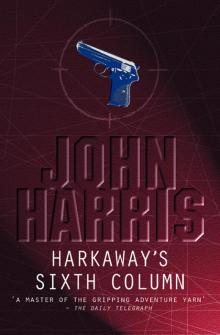 Harkaway's Sixth Column
Harkaway's Sixth Column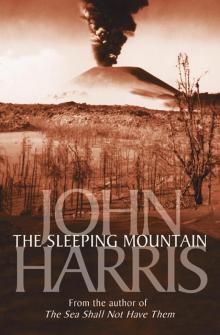 The Sleeping Mountain
The Sleeping Mountain The Claws of Mercy
The Claws of Mercy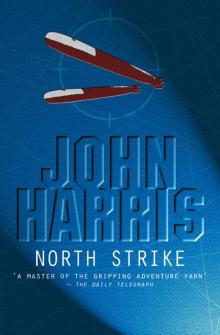 North Strike
North Strike Picture of Defeat
Picture of Defeat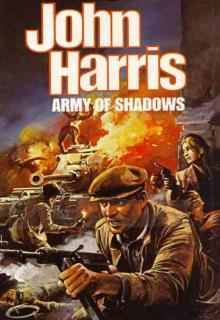 Army of Shadows
Army of Shadows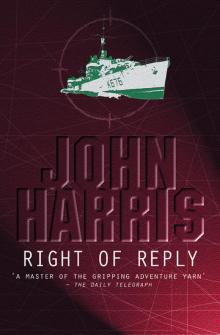 Right of Reply
Right of Reply Getaway
Getaway The Lonely Voyage
The Lonely Voyage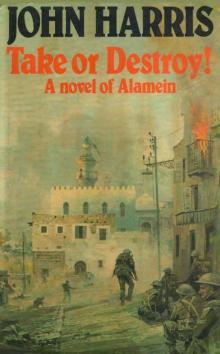 Take or Destroy!
Take or Destroy!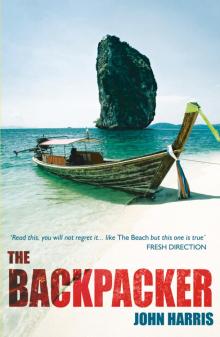 The Backpacker
The Backpacker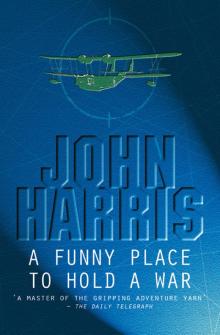 A Funny Place to Hold a War
A Funny Place to Hold a War Swordpoint (2011)
Swordpoint (2011)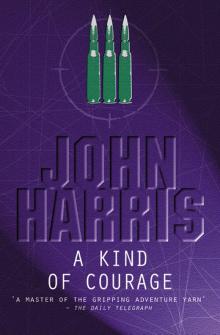 A Kind of Courage
A Kind of Courage